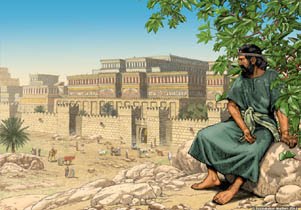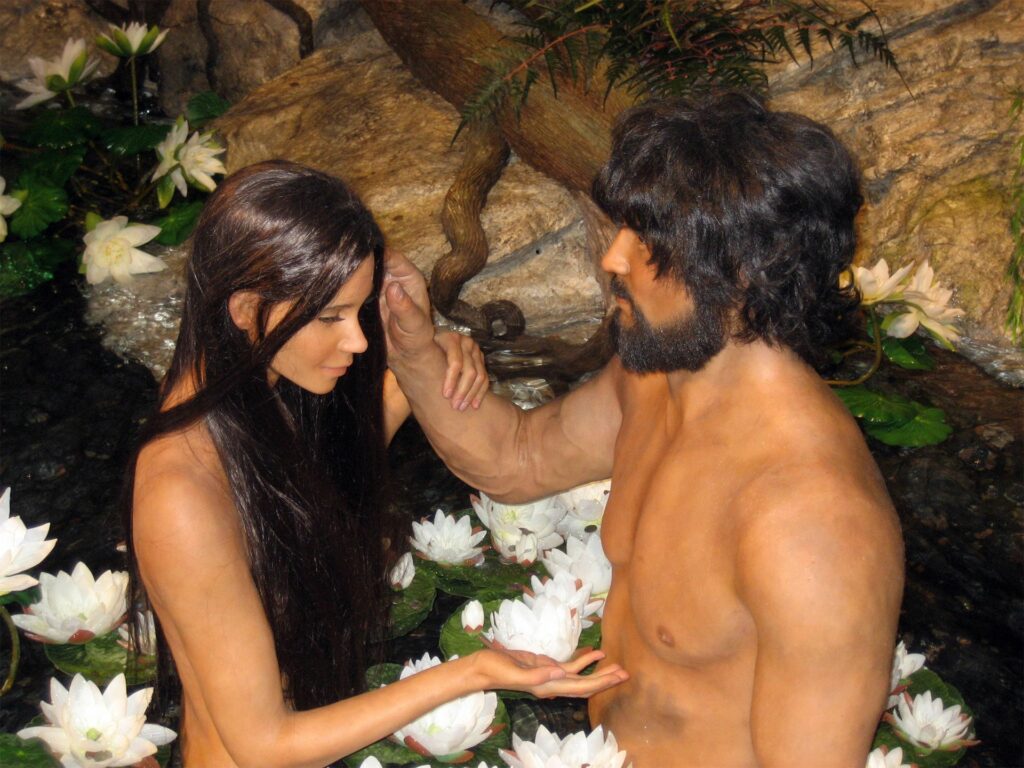Lately, I’ve been reading a series of blogs by Rob Bell called “What is the Bible?” I have actually enjoyed the series despite the fact that there are a lot of things that he says that I disagree with. It has been very insightful, and has helped to bring out new ways of thinking about the stories and texts in the Bible, and I have learned some things from these blogs.
He has talked about how all of the stories have shown how God is different from the other gods that the people of that time understood and believed in. People at that time saw gods as fickle, wrathful, and hard to please. But the God of the Bible reached out to offer hope and forgiveness, love and grace. God told people how to please and obey Him rather than leaving them wondering whether they had sacrificed enough or too little. He also brought up the point that whether or not stories like the Flood, or Jonah or Sampson were literal stories that actually happened, doesn’t matter. What matters is the point that the stories were trying to convey.
I can agree to a certain extent. For instance, in the Jonah story, I agree that what matters more than whether or not Jonah was actually swallowed by a whale or great fish or whatever, is that God’s Word was preached to a wicked people and they repented and believed God. God wanted to give these people a chance to turn to Him and they did. I often find myself forgetting about the whale and praising God that He saved these people even though His messenger was unwilling. But that does not have to mean that the whale part is not true.

Then came the blogs about Adam and Eve, and Creation. Bell seems to claim that it does not matter whether or not they were actual people, that the beginning of Genesis is just a poem, and that to take this account literally is “misguided” and that “it robs the poem of its power and eloquence.” He also said that to teach it as a literal story “turns people off to the Bible” and “sucks the life right out of them (the Scriptures).” I don’t really understand how any of this is true. How do you know it’s a poem? What about taking this account literally is misguided, and how does it suck the life out of the Scriptures? I’m not trying to start a theological debate, I’m just trying to understand where he’s coming from.
I would like to point out a few things as to why I disagree with some of the things that he says in these blogs. First, Genesis was written to Jews. The word Genesis literally means “in the beginning” in the Hebrew, and most of the Torah books’ titles were given because of the first phrase of the book. Genesis began with the phrase “in the beginning.” It also means “origins” indicating that it gave the story of the origins of life, of tribes and kingdoms, and more specifically, of the Jews. God had chosen the Jews to be His people and this book showed them where that all began and how He was fulfilling a promise to their father, Abraham.
Second, the point was brought up that we should not take the “days” as literal 24 hour days as we understand them. My question is: Why then does it specifically state that “the evening and the morning were the…day” (Ch. 1, vv. 5, 8, 13, 19, 23, 31)? Also why would God lie to his people in telling them that “in six days the Lord made the heavens and the earth, the sea, and all that is in them, and rested the seventh day”? And why would He model their work week after the creation week? The Jews understood a day to be “evening and morning.” The Jewish day started at sunset, and ended at the next sunset. But the first three days of creation had no sun or moon. But there was light and dark, day and night, so God did not need the Sun or the Moon to constitute a day.
Third, Adam is talked about throughout the rest of Scripture as though he were an actual person. He is even mentioned in a genealogy! (Luke 3:38) After the fall, there is a very good and rather detailed account of Adam’s life and his descendants that is beyond what anyone could make up if he were not an actual person. The Jews were very good at record keeping and were very meticulous about their genealogies. They wanted to know who they were, where they came from and which tribe they belonged to, but they also knew that they were all descended from one common ancestor, Adam.

I agree that the Bible is literature. It is a beautiful piece of literature filled with many different styles of writing: poetry, history, letters and records. To deny this would just be silly. But that doesn’t take away from its truths. The Bible is so much more than just a piece of literature. It is the living, breathing, infallible, inspired Word of God, and it is so because of the living Christ and the fact that God is alive and at work in this world still today. It bothers me when people turn the Bible into merely a piece of literature, and I believe that it bothers God as well. Sure, it was written by humans, but these humans were under the power of the Holy Spirit (2 Timothy 3:16, 2 Peter 1:21).
I feel that to deny that the stories in the Bible are true is to destroy the power of Scripture. In doing so, I believe that we deny the power of God to be able to do those things. So my questions to those who wish to question these stories are: Is your God not powerful enough to have created the Universe in 6 days? Is He not powerful enough to have sent a great flood to cover the whole Earth, or to have sent a whale to swallow a man and then have it spew him onto dry land 3 days later? And if He is not powerful enough to have done all of those things, is He powerful enough to have raised Jesus from the dead?
On the other hand, I agree that to simply take every story literally just because it’s what the Bible says can also destroy the power of Scripture. I believe that we need to view Scripture in light of the fact that it is a beautiful work of literature AND full of literal stories of how God showed His mighty power throughout the millennia.
It is indeed, both literature and history, and to hold strongly to one side or the other, we can miss the message that God is trying to bring us-that He created the universe and the world in which we live, that He has been active throughout its entire history, and most importantly, that He has reached out to us and wants a relationship with each of us, and that that relationship has been made possible through Jesus Christ to those who believe.








